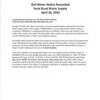Matt's money: Healthy body, healthy pocketbook
As we near the beginning of another year, many people are beginning to think New Year’s Resolutions – what do you want to better at in 2020, how do you want to improve, or get better at something?
A great place to start is your financial life. Specifically, how you get control of your financial life can be tied to getting physically healthy.
We all know the cost of healthcare has been crazy the past 10 years.
According to the EBRI, Medicare only covers about 60 percent of health care expenses for its beneficiaries.
One study found that a man would need to save $127,000 and a woman would need to save $143,000 for health care in retirement if they want a 90 percent chance of being able to pay all their future medical bills.
That’s pretty scary. Thankfully, many of these health care costs may be avoided. How? Here’s a few tips.
Get informed — Medical expertise and advice are constantly changing.
Keep yourself up-to-date on healthcare news, particularly with regard to issues that have affected you or those related to you. Ask your doctor to help you identify areas of particular concern.
Develop (or maintain) a healthy lifestyle — This boils down to simple wisdom: eat healthy, exercise regularly.
Limit fats and sugars and increase your intake of whole grains, fruits, and vegetables.
If you haven’t already, embark on an exercise program you can stick with long term. If it’s been a while since you last exercised, consult with your doctor before you begin.
Start slowly and work up to your goals.
Relax — I know, easier said than done, right?
We all know the studies about what stress can do to our health.
Maintaining friendships, focusing on hobbies, and taking time to relax may help ensure good mental health. In fact, research shows that staying socially active in retirement can alleviate stress and reduce the risk of depression.
It may also aid in the prevention of Alzheimer’s disease.
Learn your numbers — Staying healthy means monitoring a few key numbers.
You should know your blood pressure, cholesterol, and body mass index (BMI). Your blood sugar level indicates your risk for diabetes. Your doctor can perform simple tests to help you identify these numbers and recognize any vulnerability you may have.
Get preventative care — Preventing a disease or illness can be much less expensive (and painful) than treating one.
As recommended by your doctor, take advantage of free or low-cost diabetes and heart disease screenings, mammograms, and vaccinations. And make sure to get your annual physical.
There’s no way any of us can guarantee we won’t have unexpected healthcare costs in retirement.
But we can do our part by maintaining a healthy lifestyle. Don’t just make that a 2020 resolution – play the long game and make it a lifetime resolution.
Securities offered through Royal Alliance Associates, Inc. Member FINRA, SIPC. Advisory services offered through Matt Montgomery, a Registered Investment Advisor not affiliated with Royal Alliance Associates, Inc., 1504 East Rusk, Jacksonville, (903) 586-3494.
Please support The Cherokeean Herald by subscribing today!
You may also like:







